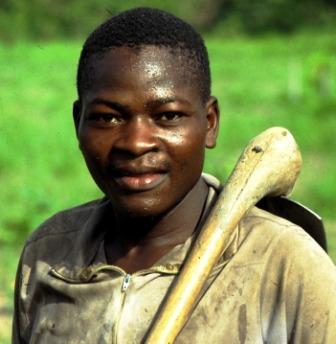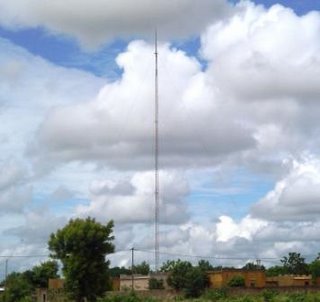
By midday the stifling humidity inside the tiny African mud hut was becoming unbearable. Beads of perspiration gathered on my forehead, and my clothes were sticking to me. It was hard getting used to living without electricity!
Despite the prickly heat, these were exciting days for us. We had moved to this isolated area in northeast Ivory Coast, West Africa with our four young children just six weeks previously. Marina and I were anxious to be a blessing and help to the Loron tribal people, and also to the missionaries who had been living among the Loron people for the past months and years. It was October, 1987.
I had spent the best part of the morning trying to analyse some of the verb structures of the Loron language, and it was encouraging to feel like I was, at last, beginning to make some progress in recognising and understanding some of the complicated patterns in the language.
A line of sweat trickled down the side of my face as I pored over pronoun charts spread out before me on the little plywood desk. My concentration was interrupted by footsteps approaching the screened door of the mud hut. Two men appeared at the entrance. One of them I already knew. His name was Chavaray. Over the previous few weeks he had helped us a lot in getting settled into village life. That morning he had been drawing water from the well so that he could hand-wash some clothes for us. The other man was a stranger. I had never seen him before.
I invited the men into the hut and Chavaray introduced me to the newcomer. His name was Hovaray. As we greeted each other and shook hands I could feel the roughness of his skin. He had obviously been working hard in his fields, growing food for his family. As I looked into his eyes I sensed an unusual intensity and alertness. He was one of those people who make a lasting impression the first time you meet them. Hovaray had some important questions that he really wanted answered.
As we had been living in the village for only a few weeks, I was not yet able to communicate very much in the Loron language. We had learned some basic greetings and practical phrases, but it would take years of concentrated language study before we would be able to effectively communicate in the Loron language. Hovaray could only speak his native tongue, Loron. He didn’t speak any French. However, Chavaray, who for a time had lived among French-speaking people in southern Ivory Coast, explained to me in French why Hovaray had come.
Hovaray was on a quest for truth. He was disillusioned with the fetish worship that permeated every aspect of Loron society. On one occasion he moved to a town far away from his people, and had tried to find ‘the truth’ by following Islam, but found no peace or satisfaction there. Having returned to his village he was now having a recurring dream. When he heard that there were white people living close to his village, he felt that ‘the whites’ could help him discover the meaning of his dream.
Hovaray told us that in his dreams he had seen a book. There were certain words on the cover of the book, but as he could not read, he wasn’t sure what the words were. He said that if he saw the book, he would recognise it. In his dream he had also seen a walled enclosure, and it was within that enclosure he had discovered the book. He had also seen people being put into a swamp and being completely covered with water. He didn’t know the meaning of the dream, but as it kept coming back to him he was desperate to find out.
As Hovaray repeated again and again the words that he thought he had seen on the book, I struggled to understand what he was saying. The words didn’t seem to be from his own language. I took out my Bible and showed it to him, and asked him if this was what he had seen in his dream. He replied, no, that wasn’t the book in his dream. I showed him a French Bible. That wasn’t it either. I couldn’t think of anything else to show him and didn’t know what I could do to help him.
Hovaray was sure that he was at the right place because when he had arrived at our home for the first time that morning, and had seen the wall of mud bricks and stone surrounding the house, put there to keep out the village cows and goats, it was just like the enclosure he had seen in his dream, and he knew that this was where he would find the book. So he kept repeating the words that he thought he had seen in his dream.
Then I remembered about the Gospel of John that had been translated into the Loron language by a Swiss translator. This portion of Scripture was the first ever to be printed in Loron just a year or two earlier, but as there were so few Loron people who could read, hardly anyone had ever seen it. There were a couple of these booklets sitting high up on a shelf inside the little mud hut. I reached up and took one of the booklets from the shelf. As I turned around with the book in my hand and asked Hovaray if this was what he was looking for, I heard a gasp, and an excited response. Yes, that’s the book! I reached it to him and he grasped it with both hands, he stared at it with wide-open eyes and slowly repeated, Yes, this is it!
That day, we had no idea what the Lord was going to do in and through Hovaray, or indeed, in and through many other Loron men and women as the Gospel was preached among the Loron people of Ivory Coast. A number of months after our first encounter with Hovaray, he put his trust in the Lord Jesus Christ alone for salvation. Hovaray, we believe, became the first Loron person to come to a clear understanding of the grace of God. He had no more dreams about books or enclosures or waters of baptism. He had found the truth. No longer a stranger, he had found the word of God, and the Word of God: the Bible and the Lord Jesus Christ.
 Literally a stone’s throw from our home in Gaoua there is a Christian radio station. The station broadcasts Bible teaching and Christian music in French and a number of local African languages. A couple of weeks ago we were given a tour around the facilities, and we were very impressed with the equipment and the work being done by the folks at the station.
Literally a stone’s throw from our home in Gaoua there is a Christian radio station. The station broadcasts Bible teaching and Christian music in French and a number of local African languages. A couple of weeks ago we were given a tour around the facilities, and we were very impressed with the equipment and the work being done by the folks at the station.
